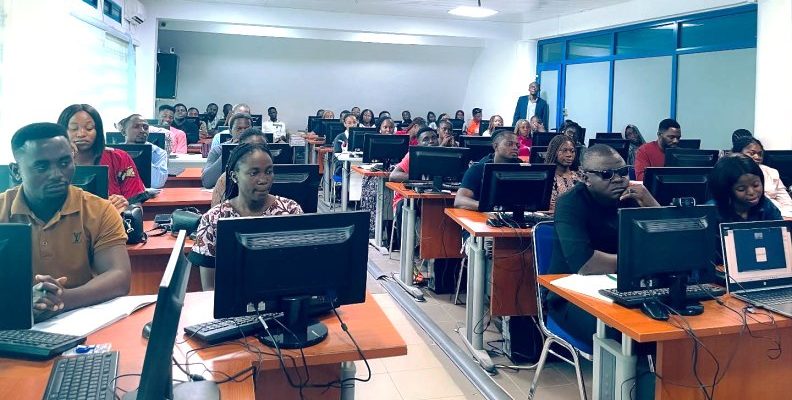– Matters eRising with Olusegun Oruame
A Strategic Alliance for Nigeria’s Youth
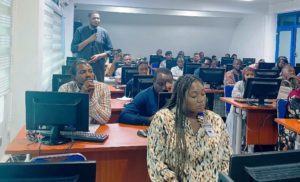
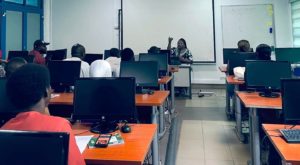
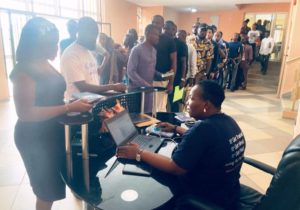
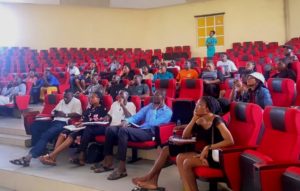
On September 1, 2025, the first cohort of the Intelligent Capacity Building Model (ICBM) officially kicked off at the Digital Bridge Institute (DBI) campuses in Enugu and Abuja, enrolling 200 Nigerian youths as pilot trainees.
RELATED: Starlink’s disruption in Nigeria: Will traditional ISPs survive Elon Musk’s Internet revolution?
This milestone marks the beginning of a transformative public-private partnership between SBTS Group, a Washington DC-based multinational led by Evelyn Lewis, and DBI, a Nigerian Federal Government agency under the leadership of Daser David.
The goal is ambitious yet pragmatic: train and employ 50,000 Nigerian youths in 36 months. ICBM’s target is to bridge the country’s digital skills gap while addressing unemployment and stimulating economic revival.
How the ICBM Model Works
Unlike conventional training programmes, the ICBM is uniquely structured as a private-capital financed initiative. It is fully backed by Geneva-based Peaceinvest, ensuring zero financial risk to the Nigerian government. Under the partnership, SBTS Group takes responsibility for de-risking the financing and carrying out critical upgrades of Digital Bridge Institute (DBI) infrastructure across its campuses, while the Federal Ministry of Humanitarian Affairs & Poverty Reduction provides policy oversight and strategic guidance. The ICBM is positioned as a human capital investment model aimed at tackling unemployment and reducing poverty.
To guarantee operational readiness, SBTS has introduced the “Arise Fund” — an initial financing mechanism designed to prepare DBI’s personnel, infrastructure, and educational platforms for immediate deployment. This ensures the programme can “go live” seamlessly and deliver on its promise of transformative digital skills training for Nigerian youth.
This is more than a training programme. It is a new deal for Nigeria’s youth. A model that can redefine how the country harnesses its human capital for growth, security, and prosperity.
The programme emphasizes a training-to-employment pathway, equipping participants with practical, market-ready skills in cybersecurity, Business Process Outsourcing (BPO), and other digital careers. Trainees are positioned as student-employees or student-entrepreneurs from day one — a radical departure from Nigeria’s theory-heavy education model.
Addressing Nigeria’s Skills Gap and Youth Unemployment
Nigeria’s youth unemployment crisis is not about numbers but about skills mismatch. Graduates emerge from universities lacking the technical and digital competencies demanded by today’s employers. This gap, worsened by weak industry-academia linkages and the “Japa syndrome” (mass youth emigration), fuels joblessness and economic stagnation.
By distilling 820 complex courses into 60 career-ready learning paths, the ICBM offers an accessible route to employment. The initiative delivers in-person, hybrid, and online training, ensuring inclusivity and reach across Nigeria’s diverse regions.
Human capital is Nigeria’s greatest asset. If harnessed effectively, it can transform the economy. The ICBM initiative is a practical step in that direction.
Economic and Social Benefits
The impact of training 50,000 employable Nigerians extends far beyond individual livelihoods:
- Improved Employability – Youths equipped with global-standard skills can secure local and international jobs.
- Boost to Tax Revenue – Newly employed graduates expand Nigeria’s taxable workforce, strengthening public finances.
- Entrepreneurship & Job Creation – Skills in business development foster new ventures, creating additional jobs.
- Foreign Exchange Inflows – Skilled professionals working remotely for international firms or emigrating legally will boost remittances and foreign currency reserves.
- Reduced Insecurity – Employment curbs the risks of crime and social unrest fueled by idleness.
In effect, the ICBM model complements President Bola Tinubu’s Renewed Hope Agenda, which prioritises youth empowerment, economic diversification, and job creation.
Regional Inclusivity and Global Vision
The decision to launch in Enugu and Abuja, rather than starting with Lagos, underscores a deliberate effort to decentralize opportunities and ensure regional equity. Future cohorts will expand to other DBI campuses, with SBTS drawing from its proven experience implementing similar BPO and skills initiatives in Sierra Leone, South Africa, India, and Liberia.
This positions Nigeria not just as a talent consumer but as a hub for outsourcing and global talent export — a vision consistent with Africa’s drive to claim a stronger stake in the global digital economy.
Why Stakeholder Support Is Crucial
The ICBM partnership between SBTS and DBI is not just another training programme — it is a nation-building initiative. It speaks to Tinubu’s recognition that Nigeria’s true deficit has been in management and leadership, not its abundant human resources.
By marrying private sector innovation with public policy support, this initiative creates a template for sustainable talent development in Africa. But for it to achieve its full potential, it must enjoy broad-based support from government agencies, the private sector, civil society, and Nigeria’s youth themselves.
ICBM is transforming education into employment
If Nigeria is to escape the trap of high unemployment, brain drain, and underdevelopment, it must invest in human capital as its strongest currency. The SBTS–DBI ICBM initiative is a bold step in that direction. It is transforming education into employment, skills into livelihoods, and youth into drivers of economic renewal.

